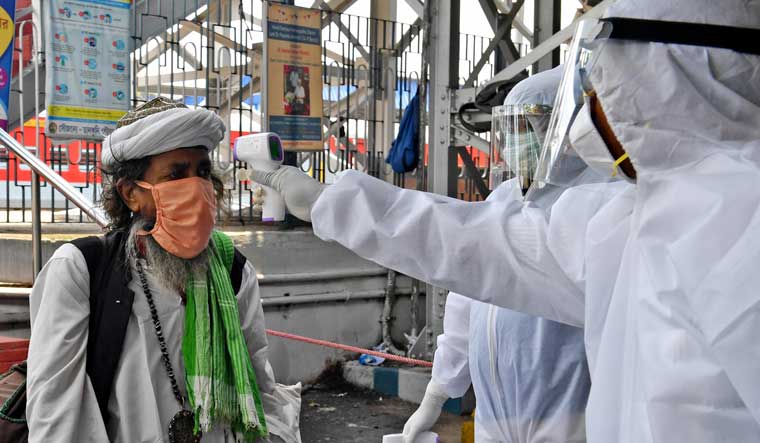As India begins to implement the exercise of “unlocking”, a section of public health experts and epidemiologists, including the deputy director general, DGHS, health ministry, have said that in developing its COVID-19 strategy—especially the lockdown—the government did not consult epidemiologists, and relied instead on “clinicians and academic epidemiologists with limited field training and skills”.
“Policy makers apparently relied overwhelmingly on general administrative bureaucrats. The engagement with expert technocrats in the areas of epidemiology, public health, preventive medicine and social scientists was limited. India is paying a heavy price both in terms of humanitarian crisis and disease spread,” the experts, including those from the field of public health, community medicine and epidemiology, have said in a statement.
The statement, issued by the Indian Public Health Association (IPHA), Indian Association of Preventive and Social Medicine (IAPSM) and Indian Association of Epidemiologists (IAE), has released a scathing statement on the way the Centre has handled the crisis.
In March, Prime Minister Narendra Modi invited national medical professional associations and sought suggestions for prevention and control of COVID-19. The president of IPHA and IAPSM attended the meeting. In April 2020, the IPHA and IAPSM constituted a Joint Task Force of eminent public health experts of India, to help the Centre in containment of COVID-19. Subsequently, Indian Association of Epidemiologists (IAE) also joined the Task Force.
Critiquing India’s “draconian lockdown”—despite which COVID-19 cases have risen exponentially—experts have said that it was done, presumably in response to a “modeling exercise from an influential institution [referring to the mathematical model from Neil Ferguson and his team at Imperial College, London] which was a ‘worst-case simulation’”, which as its subsequently turned out, was “way off the mark”. The experts have also said that the government’s policies were “incoherent”, shifted rapidly and were more of a reflection of an “afterthought” and “catching up” phenomenon on part of the policy makers, instead of a well thought cogent strategy with an epidemiological basis.
The group of experts includes Dr Chandrakant S. Pandav, former professor and head, centre for community medicine, AIIMS, Dr A.C. Dhariwal, former director, NVBDCP and NCDC, and current advisor to the NVBDCP. Other experts include Dr Puneet Misra, professor, Centre for Community Medicine, AIIMS, Dr Shashi Kant, professor and head, centre for community medicine, and Dr Sanghamitra Ghosh, Chief Medical officer, ministry of defence.
Though the expected benefit of the lockdown to spread out the disease over an extended period of time and effectively plan and manage so that the healthcare delivery system is not overwhelmed has been seemingly achieved, it has come after lockdown 4.0 with “extraordinary inconvenience” and “disruption” of the economy and life of the general public, they say.
The group of experts have also argued that given the asymptomatic, mild and non-life-threatening nature of the disease in a majority of the population, the Centre should have allowed migrants to go home at the early stage of the epidemic. “The returning migrants are now taking infection to each and every corner of the country; mostly to rural and peri-urban areas, in districts with relatively weak public health systems (including clinical care),” they say.
The experts also say that given that it is “well-established” that country is in “community transmission” stage of the disease, it is unrealistic to expect that it can be eliminated now.
The expected benefit of this stringent nationwide lockdown was to spread out the disease over an extended period of time and effectively plan and manage so that the healthcare delivery system is not overwhelmed. This seems to have been achieved albeit after 4th lockdown with extraordinary inconvenience and disruption of the economy and life of the general public.
Going forward, the experts recommend that the govt constitute a panel of inter-disciplinary public health and preventive health experts and social scientists at central, state and district levels to address both public health and humanitarian crises. The government should also allow access to data, constitute a Public Health Commission with task-specific Working, follow cluster-specified restrictions (based on epidemiological assessment) and set reasonable criteria and milestones for control of the current phase of the pandemic. They also advocate resuming all healthcare services citing “ample evidence” that the human cost of disruption of routine health services will exceed that of COVID mortalities.
They also advocate the practices of using face masks, physical distancing, cough etiquettes, and following hand hygiene, with special focus on high-risk population. Stressing on sentinel and active surveillance, they recommend “extensive surveillance” for Influenza like Illnesses (ILI) through ASHA/ANMs/MPWs, Severe Acute Respiratory Illness (SARI) through clinical institutions (including private hospitals), and daily reporting to identify geographic and temporal clustering of cases to trace transmission foci (hot spots / cluster events). “This must be supported by trained epidemiologists from local medical colleges and public health institutions,” the experts say. For future, already existing HIV serological surveillance platform could be a cost-effective way to do the serological surveillance.
Other measures include extensive testing, tracking and isolating, and strengthening ICU capacity and public health systems, and optimal PPE for frontline workers.



